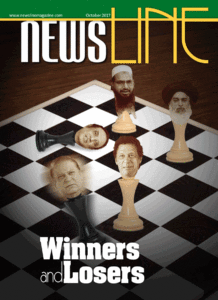Editor’s Note: October 2017
By Rehana Hakim | Newsbeat National | Published 7 years ago
 Why did the Pakistani Foreign Minister’s remarks at the Asia Society in New York, on the sidelines of the UN General Assembly session, cause a furore in certain circles back home?
Why did the Pakistani Foreign Minister’s remarks at the Asia Society in New York, on the sidelines of the UN General Assembly session, cause a furore in certain circles back home?
When Khawaja Asif said that groups like the Haqqanis and the Hafiz Saeeds, who were the “darlings of the West” during the Afghan War, were now “liabilities” for the Pakistan government and that they needed time to sort them out, was he saying something that the world didn’t already know?
Parallels were being drawn with Dawn Leaks, when the contents of a national security committee meeting were allegedly leaked by a Sharif cabinet member to Dawn, that threatened to bring down the government. Then, too, the civilians had warned army officials that Pakistan was in danger of becoming a pariah state if Pakistan’s “strategic assets” were not taken to task.
While Maulana Hafiz Saeed’s umbrage at the reference to them being “wined(!) and dined at the White House” in Khawaja Asif’s speech is understandable, one fails to understand the PTI chief’s stinging reaction. More so, since he himself, in a subsequent interview with an Indian channel, spoke of his plans to tackle all militant groups across the board. The fact that he consistently dodged a question relating to Hafiz Saeed, the alleged mastermind of the Mumbai massacres, didn’t make it any better.
Only recently, Pakistan’s current best friend, China, joined forces with Brazil, Russia, South Africa and Pakistan’s sworn enemy, India, at the BRICS summit, and signed a declaration, which names the Haqqani network, the Lashkar-e-Taiba, the Tehreek-i-Taliban Pakistan and the Hizbut Tahrir among the group of militants posing a serious threat to security in the region.
Interestingly, earlier it was always China that stood in the way of Hafiz Saeed’s Lashkar-e-Taiba being slapped with sanctions by the UN Security Council. Not so any more. The CPEC projects are underway and China would want all militant groups that pose a threat to its economic investments out of the way. The moot point is, is the establishment on the same page as China or is it still stuck in the good militant, bad militant debate?
The results of the NA-120 elections, in which two extremist groups, the Milli Muslim League (MML) and the Tehreek-e-Labbaik Ya Rasool Allah (TLY), between them garnered 11 per cent of the votes, are cause for alarm.
Questions are being raised about how groups linked to Hafiz Saeed of the proscribed Lashkar-e-Taiba, and Mumtaz Qadri, the assassin of the Punjab governor Salman Taseer, were allowed to contest the polls by the Election Commission.
Have these groups renounced militancy? Have they laid down their arms?
The PML-N accuses the establishment of backing them in order to cut into their vote bank. But there are those who maintain that the army is seriously interested in mainstreaming them. If that is, indeed, the case, does the army have any programme in the works for deradicalising them. If not, there is a clear and present danger that one might end up mainstreaming extremism?
And now that the Pakistan Ulema Council has announced its intent to contest the next general elections in 2018, this issue needs careful examination — unless one wants to see militants calling the shots (literally) in the National Assembly.
Rehana Hakim is one of the core team of journalists that helped start Newsline. She has been the editor-in-chief since 1996.


